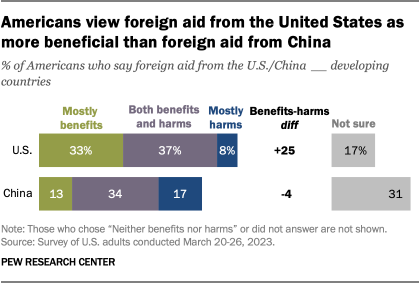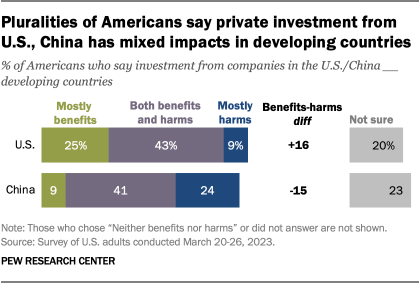
Americans say foreign aid from the United States and China both benefits and harms developing countries, according to a Pew Research Center survey conducted in March. However, they are more likely to see benefits in aid that comes from the U.S. than in aid that comes from China.
Pew Research Center conducted this study to examine Americans’ attitudes toward the United States’ and China’s foreign spending. For this analysis, we surveyed 3,576 U.S. adults from March 20 to March 26, 2023. Everyone who took part in this survey is a member of the Center’s American Trends Panel (ATP), an online survey panel that is recruited through national, random sampling of residential addresses. This way, nearly all U.S. adults have a chance of selection. The survey is weighted to be representative of the U.S. adult population by gender, race, ethnicity, partisan affiliation, education and other categories. Read more about the ATP’s methodology.
Here are the questions used for this analysis, along with responses, and the survey methodology.

Some 37% of Americans say that foreign aid from the U.S. has both benefits and harms, and 34% say the same about aid from China. But a third of Americans say that aid from the U.S. mostly benefits developing countries, while only 13% say the same about aid from China. And Americans are about twice as likely to say that Chinese aid mostly harms developing countries as they are to say that U.S. aid is mostly harmful (17% vs. 8%).
The result is that, on balance, views of U.S. aid are much more positive than views of Chinese aid. Americans are 25 percentage points more likely to say that foreign aid from the U.S. is beneficial than to say it is harmful. In contrast, Americans are 4 points more likely to say China’s foreign aid mostly harms developing countries than benefits them (17% vs. 13%).
Notably, Democrats and Democratic-leaning independents see foreign aid – regardless of whether it’s from the U.S. or China – as more beneficial for developing countries than Republicans and Republican leaners do. Nearly four-in-ten Democrats (39%) say that U.S. aid mostly benefits developing countries, compared with roughly three-in-ten Republicans (29%). And 16% of Democrats, but only 10% of Republicans, see Chinese aid as mostly beneficial.
Views of investment from American and Chinese companies

Similar to their views on foreign aid, Americans have mixed views on the impact of private investment from American and Chinese companies on developing countries.
Roughly four-in-ten Americans say such investment by companies from either country is both beneficial and harmful. However, a quarter of Americans say that investment by U.S. companies mostly benefits developing countries, compared with 9% who say the same about Chinese companies.
On balance, Americans are 16 points more likely to say investment from American companies mostly benefits rather than harms developing countries. Conversely, they are 15 points more likely to say investment from Chinese companies mostly harms developing countries than benefits them.
Partisan opinions on investment from private companies also differ depending on whether the companies in question are American or Chinese. Republicans are more likely than Democrats to say that investment from U.S. companies mostly benefits developing countries (30% vs. 21%). And for Chinese companies, Republicans are far more likely than Democrats to say investment is mostly harmful (32% vs. 18%).
For their part, people in middle-income countries included in a recent cross-national Center survey generally see investment from both the U.S. and China as benefiting their country’s economy. (That survey asked about investment generally, either public or private.)
Note: Here are the questions used for this analysis, along with responses, and the survey methodology.
